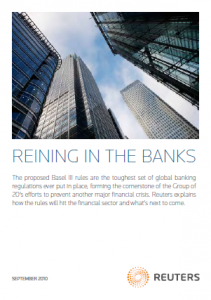Reuters a publié en septembre un rapport spécial qui présente les nouvelles règles de Bâle III ainsi que leurs impacts sur le secteur financier. Ce papier analyse également les prochaines évolutions prévues par le G20 en vue d’éviter toute nouvelle crise financière majeure.
Ce rapport de 15 pages regroupe des synthèses, des analyses ainsi que des liens vers des commentaires en vidéo par exemple.
Global leaders are set to give their seal of approval to a set of tougher bank capital and liquidity standards when they meet in Seoul in November, putting in place the world’s core regulatory response to the financial crisis.
The Basel III package starts rolling out in 2013 and takes full effect six years later.
Experts believe leading banks will want to show they can comply sooner rather than later as part of wider efforts by the sector to win back the public’s trust.
The world leaders from the Group of 20 countries who will rub shoulders in Seoul are likely to be a congratulatory mood over the speed at which Basel III was drafted and approved – roughly a year compared with the decade of wrangling its tarnished predecessor took to agree.
But the G20 won’t be resting on its laurels and will now turn its attention to the equally tricky task of dealing with “too big to fail” banks.
The Financial Stability Board, which implements G20 regulatory measures, will present leaders with a range of options for ensuring that big banks in future cannot assume the government will shore them up in the next crisis.
But one of those options – a surcharge on large systemically risky banks – has already been rejected out of hand by France in a sign of how hard it will be to impose a common global approach.
The G20 will also look at ways to crackdown on opaque derivatives trading, how to tackle the “shadow banking” sector and rein in the influence of credit rating agencies.
via Reuters special report : Reining in the Banks (cache)
 Global leaders are set to give their seal of approval to a set of tougher bank capital and liquidity standards when they meet in Seoul in November, putting in place the world’s core regulatory response to the financial crisis.
Global leaders are set to give their seal of approval to a set of tougher bank capital and liquidity standards when they meet in Seoul in November, putting in place the world’s core regulatory response to the financial crisis.